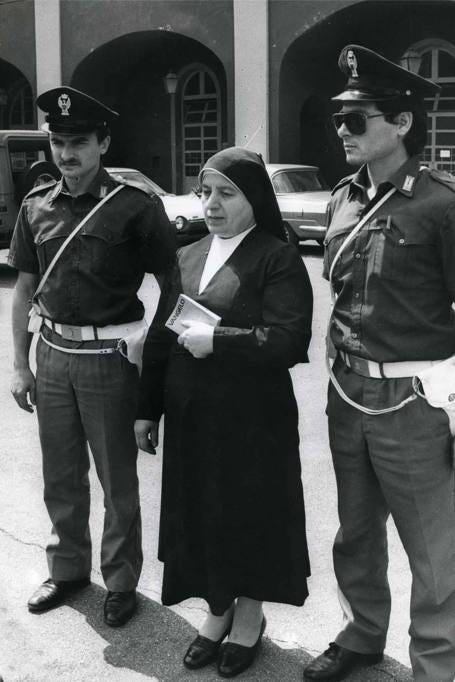It seems that Sister Anna Donelli, accused of collaboration with the ‘Ndrangheta in Brescia, and being the messenger between the boss Tripodi and his imprisoned clan members, is not the first nun to be accused of involvement with organised crime. One of my Italian sources had pointed this out to me, for which I am grateful. That honour belongs to Sister Aldina Murelli who was arrested on 17th June 1983, as part of a huge round up of suspected members of the Camorra in Naples. Sister Aldina was accused of being the messenger between the boss Raffaele Cutolo and his men in Poggioreale prison, where she was a frequent visitor. At that time Sister Aldina was 51 years old, which means she has probably gone to her eternal rest by now.
Here is how The Catholic Herald reported the matter on 1st July 1983:
“SR ALDINA MURELLI, the Italian nun arrested in the crackdown on the Camorra, the Neapolitan mafia, hid messages and money in her Bible when she visited jailed gangsters, Italian authorities have alleged. The allegations were made after the 51 -year-old nun was interrogated for several hours by public prosecutors over the weekend. She is one of more than 500 suspects rounded up by police in their attempt to break up the drug trafficking, protection rackets, prostitution, and corruption rife in the area. Sr Aldina, who used to teach at a school in Naples run by the Sisters of Charity of the Most Precious Blood, is being held in the city's Poggioreale prison.
She has denied charges of being a messenger between Camorra bosses, including Raffaclo Cutolo imprisoned on "Devil's Island", and Mafia men inside the Naples prison. "I was only trying to redeem those poor young men and put them back on the straight and narrow path," she is reported to have told her interrogators.”
On the 18th November, The Catholic Herald carried this piece:
“AN ITALIAN nun who had been arrested on charges that she passed messages for an alleged mobster has been released from prison and placed under house arrest in a Naples convent, police said last week. Sr Aldina Murelli, 51, a member of the Daughters of Charity of the Most Precious Blood of Jesus, who has taught elementary school since 1955, has said she is innocent. She was arrested June 17. Prison officials released her from jail on November 5 and have said she can stay at her convent in Portici, on the outskirts of Naples. Prosecutors allege that Sr Murelli carried notes to and from Raffaele Cutolo, whom, they allege, heads a major Naples criminal organisation. Cutolo is serving a 10-year sentence for extortion. At the time of her arrest, Sr Murelli, who had made frequent pastoral visitations at the prison housing Cutolo, said, "They will not stop my faith. I want to save everyone, not only Cutolo!””
The Italian press were a bit more forthright with the story and the allegations against the good sister.
“But what could a nun, and specifically, Sister Aldina Murelli, be recruited for? Which of the characteristics of a nun could be used to benefit the Camorra? Confidentiality. Being beyond suspicion. “Postwoman”, “Encyclopaedia”, “Our Lady”, were the three nicknames, or code names, with which the Camorra indicated the nun, a member of the Institute of the Daughters of Charity of the Most Precious Blood of Herculaneum. Postwoman, because she delivered messages from the boss, Encyclopaedia because she knew everything, Our Lady because she was a nun. Her function was to acquire the Boss's directives and have them sent to the inmates who were his affiliates, so that from the inside they could receive operational instructions regarding settling scores, or any other activity that required their intervention inside the prisons. But how could she communicate with the inmates without arousing suspicion? The system was very simple. Officially, the nun had begun a correspondence with some inmates to try to accompany their process of redemption, to heal their souls longing for God's forgiveness and human understanding. During the trial, the nun continued to support this thesis, declaring herself sincerely interested in the fate of the souls she followed. The reality, the pentiti and the investigators claimed, was different. Sister Aldina Murelli was a real hub for the distribution of orders and information between Cutolo and the other members of his clan in Poggioreale. The fact that Sister Aldina had dedicated herself to this task was explained by her real veneration for the Boss, considered a benefactor on a par with Christ. But another reason drove her to provide her services on behalf of the Camorra cause: filthy lucre. Sister Aldina was in fact a paid employee. And not even a second rate one, if you consider that her monthly salary was between four hundred and five hundred thousand lire. Back then, it wasn’t peanuts, and it wouldn’t be peanuts today either….. When Sister Aldina was surprised by the police who, in the middle of the night of that June 17th knocked on the doors of the convent, her reaction was not the most composed. Between screams, shouts, and even attempted assaults, the nun certainly did not apply the gospel law of "Turn the other cheek", but resisted arrest with all her strength. Once she regained her calm, however, (but not before having torn the shirt off an officer), she allowed herself to be taken to the police station without creating further difficulties. She only insisted, once she got out of the car, before entering the police station, that the crowd of photographers who were about to immortalize her be put in a position to catch the Gospel that she brought with her from the convent.”
It is at this point that one begins to have a sneaking sympathy for all those who had to deal with Sister Aldina, who was clearly no pushover. But as it turned out the jury was not impressed. Sister Aldina was found guilty in September 1985 and sentenced to four years and two months in jail. What happened to her after her release, and whether she was expelled from her order, I have not been able to ascertain.
Why did she do it? After all, she was a nun. Perhaps the answer lies in two things.
First of all, nuns have a relatively low status in the Catholic Church, even in Italy, where they are often treated as little better than domestic staff, without the pay, the days off or the freedom when not on duty that domestic staff have. Most of this is accepted uncomplainingly, but it must rankle to be constantly treated as a second class citizen in the Church, as is often the case. But some nuns do rise to positions of prominence. The nun who acted as housekeeper to Pope Pius XII, Mother Pascalina, was immensely powerful. The various nuns who appear on Italian television doing cookery programmes or football commentary are also celebrities. But for Sister Aldina, life must have been dull. And then came along the charismatic leader of the Nuova Camorra Organizata, Raffaele Cutolo, who offered a whole new life to Sister Aldina. It is not an excuse, I realise, but it does perhaps make a career helping the Camorra that much more understandable.



